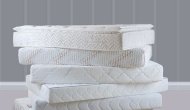In the silent canvas of the night, a noisy bed can be a relentless disruptor, stealing away the serene symphony of slumber. Imagine a bed frame whispering tales of wear, a box spring crooning a cacophony like a cricket, and every turn you take echoes with the sound of wood-on-wood contact. Squeaky beds are more than just an annoyance; they can disrupt your sleep cycle and hinder your ability to move into a deep sleep.
But fret not, for the symphony can be restored. There are a few simple yet effective solutions to fixing a noisy bed and not all of them involve buying a new one. Whether it’s applying a whisper of lubricant, or tightening the silent screws that have loosened their grip, the solutions are many and within your reach.
By following these simple tricks and tips, you can turn your noisy bed into a silent sanctuary, ensuring peaceful and uninterrupted sleep.
Overview
Say Goodbye to Noisy NightsFAQ
Where Does The Noise Come From?

Before going through some of our recommended solutions, it's important to understand what might cause your bed to squeak. The culprit could be one of three components of your bed: the mattress, the bed frame, or the box spring, which will have their ways of fixing, or not, but for now, let’s look at why these parts are not working well.
Mattress
If your mattress is causing the noise, it's most likely an innerspring mattress or low-quality pocket coil. These types of mattresses contain metal springs, which can rub against each other and create noise, especially as they age.
As with everything else made of metal, the material inside a spring mattress can deteriorate and even rust over time. All-foam and all-latex mattresses, on the other hand, are less likely to squeak as they need more metal components.
Bed Frame
Bed frames, whether made of wood or metal, can also be a source of noise. This usually happens when the screws or bolts become loose, causing the frame to wobble. Changes in humidity can also cause wooden frames to warp, leading to squeaks.
Ever wonder why your doors suddenly scrape against their frames during the hotter months? The humidity in the air causes the wood to swell and thus throws the entire setup into limbo. The same thing can happen to your bed frame!
Box Spring
Box springs function as a supportive foundation for your mattress. They comprise a wooden frame wrapped in fabric. Over time, it can wear out causing noise.
Additionally, the wooden frame of the box spring rubbing against the bed frame can also lead to squeaks. Much like the bed frame and the mattress, your box spring can make a lot of noise because of a combination of problems.
Step-by-Step Guide to Fixing a Squeaky Bed

Once you've identified the source of the noise, you can follow these steps to silence your noisy bed. Keep in mind, that not every solution is suitable for every situation so if you follow these steps and still don’t have excellent results, it may be time to invest in a new bed entirely.
If you are going this route, we recommend taking this as the time to upgrade. Perhaps investing in a foam mattress instead of a spring-coil one to give yourself a longer wear time.
Now let’s get into the fixing!
Pinpoint the Source of the Noise
First, locate precisely where the noise is coming from. For this, you'll need to listen carefully as you apply pressure to different parts of your bed, including the mattress, bed frame, and box spring.
Take it on in small sections and recruit some outside help if needed. We find it best to separate your bed into the three main parts—mattress, bed frame, and box spring—and test each separately.
Try to apply constant pressure as you move the frame around or push your hand on top of different areas of the mattress. Once you hear the noise keeping you awake at night, keep going. The problem could be in more than one area.
Tighten Up

If your bed frame is causing the noise, start by tightening all the joints. Use a wrench or a screwdriver to tighten the bolts or screws. Additionally, consider using plastic washers to prevent metal-on-metal contact, which is often a cause for squeaking.
However, if you see parts of the bed that are structurally unsound, you will likely need to replace them. We suggest getting a platform bed as they have a long shelf life and are made of materials not as prone to squeaking.
Lubricate the Problem Areas

For metal bed frames, or any frame with metal bolts or screws, applying a lubricant can help reduce noise. A product like WD-40 can be effectively used to lubricate the joints.
Please remember to work in a well-ventilated area to avoid inhaling any fumes that might cause a reaction.
For wooden frames, beeswax or candle wax can be used as a lubricant to reduce friction between wooden parts. You can also purchase wood-specific wax to help with this task if you do not have candle wax at home.
Add a Cushion
If the noise is caused by friction between the mattress and the bed frame, adding a layer of cushioning can help. A thin fabric material such as an old T-shirt, sock, or kitchen towel can be used to line the bed frame, reducing friction, and eliminating noise.
Alternatively, you can test out getting a mattress topper to help get rid of the noise. A topper will also aid in promoting better sleep and temperature control, helping you get even better sleep!
Check the Legs of Your Bed Frame
In some cases, the bed frame may not be even with the floor, causing it to wobble and make noise. In such cases, adding padding under the specific legs can help even things out.
When adding padding to the legs, please ensure you use material that is secure and will not cause the bed to wobble or the leg to break if the frame shifts in the night. If in doubt, please consult a professional furniture builder.
Tackle the Wheels
If your bed frame has wheels, using caster cups can help reduce movement and noise. The wheels are made of plastic and are even know to break over time causing other problems. If the wheels are not essential, consider removing them and using furniture pads instead.
Address the Wood-on-Wood Contact
If your bed frame is wooden, look for areas where there is wood-on-wood contact. This can often cause noise.
Following our advice above, use wax to eliminate noise from squeaky areas. It is important to remember that wax is a natural product and will rub off over time. Reapplication may be needed again in the future.
Rotate Your Mattress
If your mattress is the source of the noise, try rotating or flipping it. This helps distribute the wear and tear evenly across the mattress, potentially reducing noise.
You should always take good care of your mattress regardless of noise. Rotating it regularly and keeping it fresh and clean is essential for its longevity.
Cushion with Plywood
If rotating the mattress doesn't solve the problem, try placing a thin piece of plywood under the mattress. This can help make the base firmer and minimize the squeak.
One thing to remember when doing this is the plywood will stop airflow through the mattress, which in turn might change the temperature of your sleep. In this case, it may be best to purchase a low-profile box spring instead as it will act in the way of plywood but provide proper air circulation.
Consider a Replacement

If none of the above steps work, it might be time to replace the noisy component, whether it's the mattress, the box spring, or the bed frame. While this may seem daunting, think of it as an upgrade to your lifestyle and health.
Although the source of the noise might be a box spring, in some cases you might have to replace your mattress as well. Sometimes what causes a noisy bed is a lack of proper support under your box spring. Without proper support, the box to dip in the middle, causing your mattress to sag as well.
This will contribute to back pain and discomfort and can damage the mattress as well. In this scenario, replacing everything will be your best option.
There are products available for all levels of comfort and budget. Sometimes the best thing you can do for your well-being is to invest in it.
Before making a purchase, we suggest you look at all the current options out there. Mattress innovation has come along significantly, and you’d be surprised at the variety available. Your noisy bed might be the best thing to have happened to your sleep, after all!
Say Goodbye to Noisy Nights

A squeaky bed can be a real nuisance, disrupting your sleep and leaving you feeling groggy and irritable the next day. Fortunately, with a little patience and some handy tips, you can silence your noisy bed and enjoy peaceful, uninterrupted sleep.
Whether it’s the subtle application of lubricant or the careful tightening of loosened screws, the power to restore tranquility to your nights is within your grasp. When using products like lubricants stay away from harmful chemicals that will affect your air quality, or worsen symptoms of allergies or asthma.
Remember, if your bed continues to squeak despite your best efforts, it might be time to replace the noisy component. After all, a good night's sleep is invaluable, and purchasing a new bed, bed frame, or box spring could be well worth it in the long run.
Sleep well, knowing that your bed won't interrupt your rest. The peace of mind and the sound, restful sleep you'll enjoy are well worth the effort of fixing that squeaky bed. Sweet dreams!
FAQ
Q: What are some quick fixes for a squeaky bed if I can't immediately invest in a new mattress or bed frame?
A: Quick fixes include tightening all loose bolts, nuts, or screws on your bed frame, lubricating metal, and placing padding between the mattress and bed frame to reduce friction. For wooden frames, applying wax at the areas of wood-on-wood contact can minimize squeaks. These solutions are temporary but can provide immediate relief from the noise.
Q: How often should I rotate or flip my mattress to prevent it from squeaking?
A: Rotating or flipping your mattress every 3-6 months can help distribute wear and tear evenly, potentially reducing noise. However, the frequency might vary based on the type of mattress you have. Always follow the manufacturer’s recommendations regarding the care and maintenance of your specific mattress.
Q: Can the type of flooring under my bed affect the noise it makes?
A: Yes, the type of flooring can influence the noise level. Hard surfaces like hardwood or tile might amplify the sound, while carpets can help dampen it. If your bed is on a hard floor, consider adding a large, thick rug beneath it to reduce noise.
Q: How can I fix a squeaky wooden bed frame?
A: Fixing a squeaky wooden bed frame can often be achieved with a few simple steps. First, identify the exact source of the squeak by applying pressure to different areas of the frame. Once located, tighten any loose screws or bolts.
If the squeak persists, consider applying a lubricant like beeswax, paraffin, or a specialized wood lubricant to areas of wood-on-wood contact. This application reduces friction, helping to silence the squeak. If the frame is old and continues to make noise despite these fixes, it might be worth considering a replacement or professional repair to ensure the frame's integrity and your safety.
Q: Why does my bed creak when I move?
A: Beds creak when there is friction between their components or when parts of the bed are loose or worn out. The common culprits include an old or deteriorating mattress, a loose or damaged bed frame, or a worn-out box spring.
Innerspring mattresses often creak as the metal springs inside them rub against each other or become worn. Wooden bed frames may creak due to loose joints or when the wood swells and contracts due to changes in humidity. Metal frames may squeak if the bolts and screws are loose.
Q: How can I fix a squeaky box spring?
A: A squeaky box spring can often be silenced with a few strategic steps. First, remove the mattress and locate the source of the squeak. Make sure that your box spring has proper support under it.
Without proper support, the box spring can sag in the middle causing the mattress to sag as well. This will cause back pain and damage the mattress.
If the noise is coming from wood rubbing against wood, applying wax or another lubricant can help.
Q: How can I stop a metal bed frame from squeaking?
A: Silence a squeaky metal bed frame by first identifying and then tightening any loose bolts, nuts, or screws. If the squeaking continues, apply a lubricant to the joints and any area where metal meets metal. Using felt, cork, or rubber washers between the frame's joints can also help reduce noise. If these steps don't resolve the issue, inspect the frame for damage; you might need to replace individual parts or the entire frame if it's significantly worn or bent.

TL;DR: How to fix a squeaky bed
A squeaky bed can disrupt sleep, with the noise typically originating from the mattress, bed frame, or box spring. To silence it, first, identify the noise source by applying pressure to different bed parts.
For noise from the bed frame, tighten all joints, lubricate metal components, and use wax for wood-on-wood contact areas. If the mattress is the culprit, consider rotating it or placing plywood underneath for added firmness. If these solutions fail, consider replacing the noisy component, with various options available to suit different budgets and comfort preferences.










